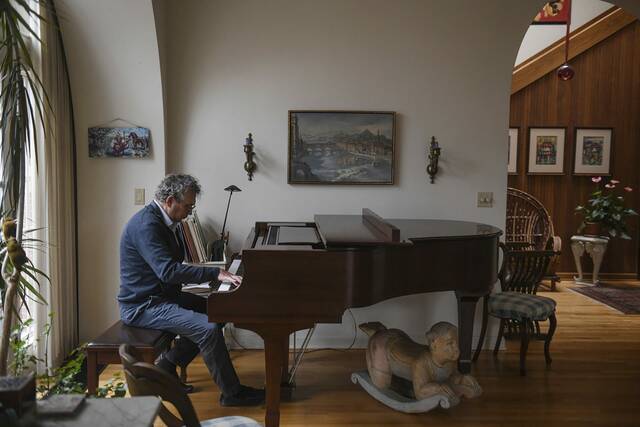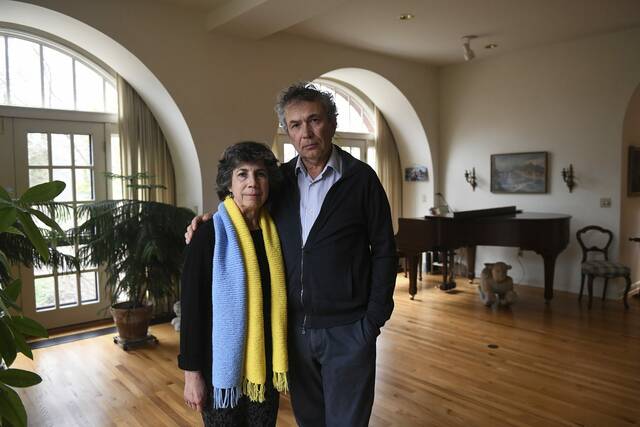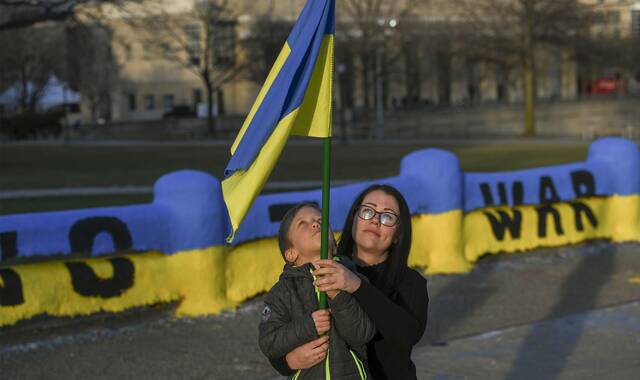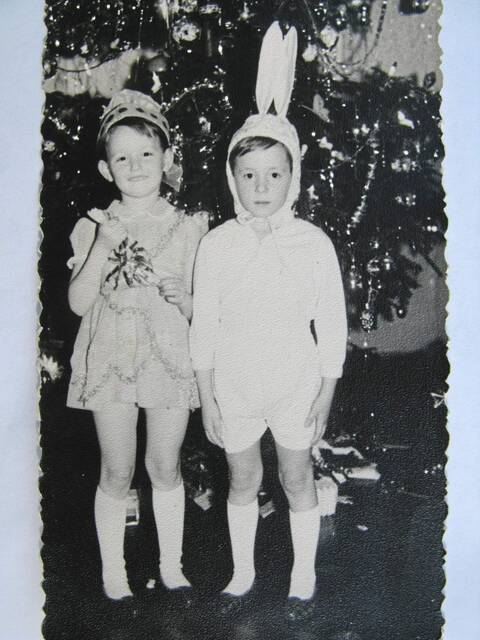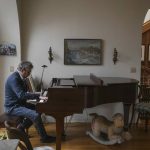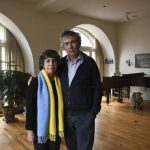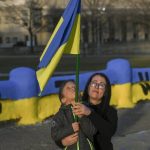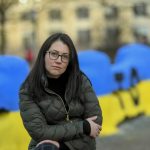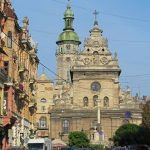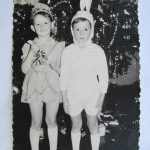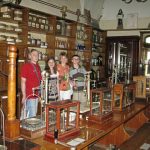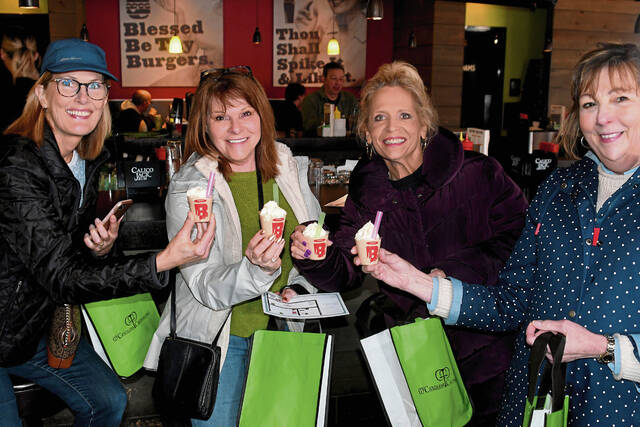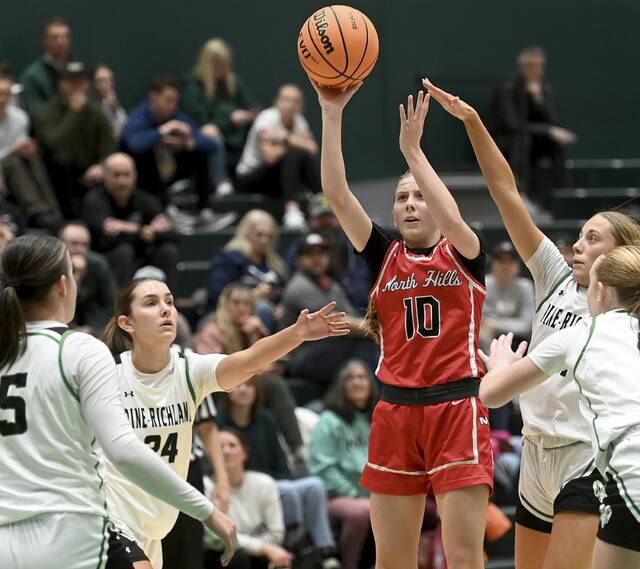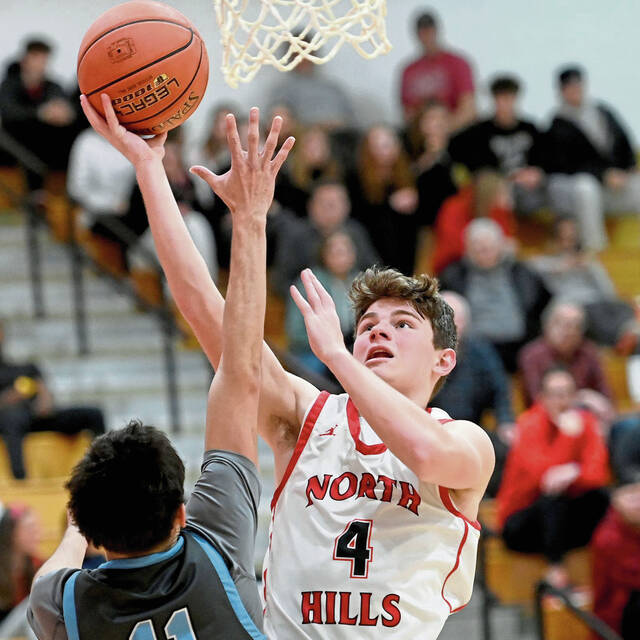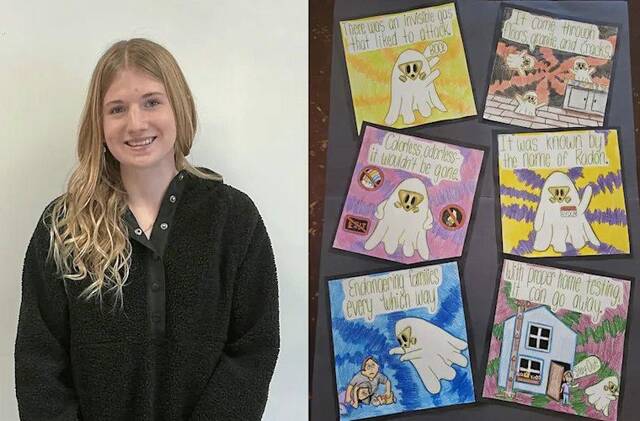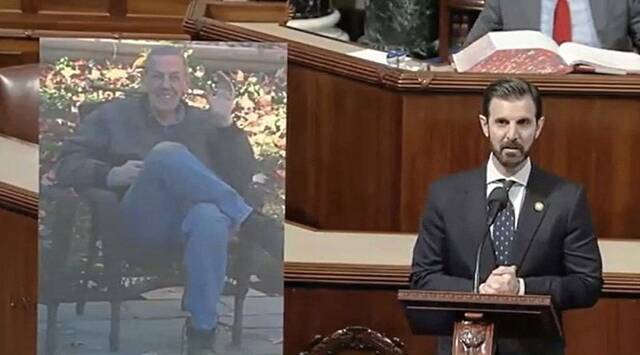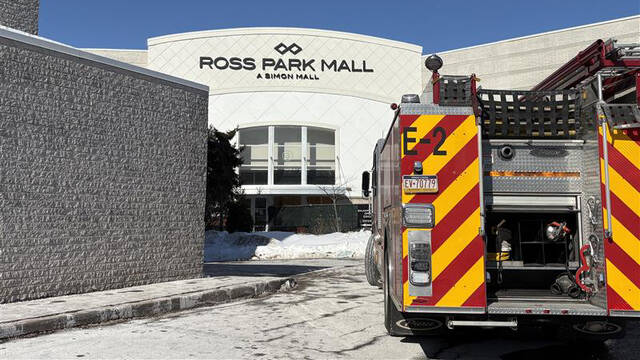Tears. Helplessness. Heartache. Nightmare. Denial.
These are some of the reactions from people of Ukraine living in Western Pennsylvania when they heard about the military assault on Ukraine by Russian President Vladimir Putin last month.
They’ve spent the past 11 days seeing videos and photographs documenting the destruction of their beloved country, frantically reaching out to contact loved ones, and gathering to pray.
Here are a few of their stories.
Natalia Onufrey, 59, Franklin Park
The tears keep coming from Natalia Onufrey’s eyes.
“This is a nightmare,” said Onufrey, 59, a native of Lviv in western Ukraine, on Wednesday. “What is happening in Ukraine is horrible. To watch everything unfold, I just can’t believe it. I’ve been crying for days. This is not a movie or video game. This is real life.”
The first thing Onufrey did when she heard about the military assault on Ukraine was to check on her twin brother Pavlo and their 90-year-old mother, who is living in a skilled nursing facility in Ukraine.
During one conversation, her brother told her he had to hang up. He said he, his wife and her elderly mother and father, who is battling cancer, and a neighbor who recently lost her husband, had to leave their homes immediately. There was word of bombings coming to a nearby military airport.
They made it out safely and gathered in the small grocery store her brother owns across town. They stayed there for a few days. There were no beds or places to sleep.
They grabbed important documents and a few personal items because they were not sure when they could return home.
“I just want this all to stop,” Onufrey said. “I have been crying for days. And now, I am angry. How can one person (Putin) turn the world upside down?”
Onufrey normally makes trips to Ukraine every two years. She had planned to visit this spring.
The pandemic prevented her 2020 trip.
A major fear is not being able to see her mother, who has some health issues. Onufrey said she is concerned health care workers may decide they aren’t safe in the facility where her mother resides. She worries about her mom getting the care she needs.
Onufrey hasn’t been sleeping well. She said she feels some guilt that she is safe.
Onufrey came to the U.S. 32 years ago. She met her husband here. He has Ukrainian roots and knows the language. They were married at St. Peter & St. Paul Ukrainian Orthodox Church in Carnegie and live in Franklin Park
“The people of my church are like a second family to me,” Onufrey said. “As a parish, we do so many good things for the church and for the community.”
Onufrey said she has been getting calls from people she hasn’t seen or talked to in more than 10 years.
“Everyone in Ukraine are my people,” she said. “I feel connected to them. I also feel bad for the Russian soldiers. (Putin) is harming his own people. He is not a leader.”
The past week has made her realize the fragility of human life, she said.
“You never know what tomorrow will bring,” she said. “I consider myself an American. I love this country. I am thankful for technology to be able to communicate with family and be able to see what is happening as hard as it is to see what is happening.”
She said she sometimes complains about the small stuff, but seeing the devastation in Ukraine makes her realize what’s most important.
When she was growing up, her mother always told her not to worry as long as there aren’t bombs flying over their heads and sirens blaring.
“My mother is a wonderful role model,” she said. “She has lived through so much in her life. It is heartbreaking. Nothing in your life can prepare you for what you are seeing in Ukraine. I have a broken heart but I see the bravery of the Ukrainian people. At first, I was in denial of what is happening and then disbelief and then tears, lots and lots of tears. I can’t stop crying.”
Karina Shevchenko, 36, Ross
Karina Shevchenko reads books in the Ukrainian language to her 5-year-old son, Mark, at bedtime.
“It’s not that easy, as he asks the meaning of every second word,” said Shevchenko on Monday. “It’s hard for him to understand. But it’s important that he knows Ukrainian.”
It’s become even more important the past week, said Shevchenko, as she stood on the campus of Carnegie Mellon University, where she works. Nearby was The Fence, known as “unofficial university billboard,” in the center of campus. It is painted between midnight and sunrise by students who stand guard as long as they want their message to stay.
The Fence today is yellow and blue — the colors of Ukraine. An inscription reads: “No To War.”
“We came here in search of a more stable life,” said Shevchenko, who is expecting her second child with husband Vitalii Shevchenko. “In Ukraine, we felt like there was no stability. So we challenged ourselves and moved to a country of opportunities, the United States of America.” They live in Ross.
The couple has lived in the U.S. since February 2016. When the news came out about the military assault on Ukraine, Karina Shevchenko wanted to do something to help.
Through social media, she connected with Anastasia Gorelova from Carnegie, who is Russian, and Alesia Kaplan of Point Breeze, who is from Belarus, to organize a vigil in Squirrel Hill on Feb. 24.
She noted that Putin and his propaganda say that they want to protect Russian-speaking people from pro-Ukrainian government, forces and power.
“They are constantly using this excuse to justify Russian presence on the territory of Ukraine,” she said.
She has friends and family in Ukraine and stays in contact with them. Karina Shevchenko was born in Kryvyi Rih, where people spoke Russian when she was growing up.
She said until last week she hadn’t thought anything bad concerning her speaking Russian rather than Ukrainian.
Related
• Ukrainian traditions, roots abound in Westmoreland County
• Feisty Ukrainian resistance explained by Pitt scholars
• Penn Hills man’s Ukrainian family has history of resisting Russian invasions
• Ukrainian immigrants have become part of fabric of Western Pa.
• More on the Russia’s war on Ukraine
“I never thought that language matters,” she said. “That’s only right now I realized that this cultural identity means a lot for the whole nation. Every Ukrainian has to speak Ukrainian as their first language, not Russian as it happened to me.
“Cultural identity matters. I wish the realization of that had come earlier to me. I feel that was my biggest mistake in life so far. ”
She said she will make a concentrated effort of honoring her heritage by serving ethnic meals of borscht, a beet soup and pel’meni, a dumpling dish. During the Christmas and New Year holidays, she makes Ukrainian salads.
Shevchenko said Pittsburgh has been a welcoming city since her arrival. Friends, neighbors, and co-workers have supported her. On this day at Carnegie Mellon, a few people stopped to talk with her when they saw her son holding a Ukrainian flag.
The university’s Biomedical Engineering Department, where she works, initiated a fundraiser. They donated $800 to support Hope for Ukraine in her name.
“I am tremendously grateful to my dear colleagues for this help,” she said. “
Watching women joining Ukraine defense units has motivated Shevchenko, who said she continually checks social media to try to stay informed.
“If I were there, I would definitely do that,” she said.
“I hate this feeling of being helpless. That’s why I am trying to stay proactive here by organizing the rallies, talking about Ukraine, collecting funds and uniting with other Ukrainians. I figured that making small, but productive steps and actions that can help Ukraine is better than checking the newsfeed every 10 minutes and staying under the stress from the news as those are horrifying news.”
Taras Filenko, 63, Squirrel Hill
Taras Filenko sat at the piano on Tuesday in his Squirrel Hill living room and played the song “Elegy” by composer Mykola Lysenko, the founder of Ukrainian classical music.
Filenko, a pianist, lecturer and author, has written a book about Lysenko. Hearing and playing music from his home country provides some comfort.
Filenko, 63, was born in the Ukrainian city of Zaporizhzhia and then moved to the capital Kyiv when he was 5. He came to the U.S. when he was 35 as a Fulbright Scholar.
“This is barbaric what we are seeing,” said Filenko, as he watched a video on his smartphone showing the devastation in Ukraine. “I am in disbelief. Innocent people are being killed.”
He and his partner, Elsa Limbach, 67, agree that war is no way to solve any disagreement. The couple can’t believe this destruction is happening in the year 2022.
The two met at the music studio inside the Jewish Community Center in Squirrel Hill. Years later, they collaborated on the development of a theater dance piece, “Stalking the Sublime,” with music by Ferenc Lizst. It was produced in Costa Rica by a colleague of Limbach’s Edmond Scott. Limbach, founded Dance Alloy Co., and Filenko was the pianist for a dance project in Costa Rica. Limbach has a Ukrainian grandmother.
Filenko and Limbach had planned to visit Ukraine this summer.
As Filenko looked at the front page of Tuesday’s New York Times, he recognized an apartment building in his hometown that had been bombed.
“I used to walk in front of this building early in the morning to get to class to learn Ukrainian,” he said, tearing up. “My mother wanted me to learn the language. The national identity was strong in my house growing up.”
Filenko continues to honor his national identity – he attended a vigil in Squirrel Hill on Feb. 24 and he and Limbach plan to travel to Washington, D.C., for a gathering to support Ukraine on Sunday.
“Nobody believed this was going to happen,” he said. “There is so much heartache. The people of Ukraine are willing to fight and they are willing to die. Ukraine needs so much support.”
Filenko said Putin and his army are fighting for the obliteration of the Ukrainian nation.
His nephew joined the self-defense battalion and most likely would be on the front line of fighting by Wednesday — the same day the daughter of a friend reached the Polish border.
The family decided Aida Karagezian should flee. Her parents and brother remain in Ukraine. Her father and brother are of the age to serve in the Local Defense force. Her mother decided to stay in Kyiv with her husband.
“I had tears in my eyes when we passed passport control and we saw tables with goods on them, hot drinks, pampers for children and even food for dogs,” said Karagezian on Viber, a messaging system. “Kindness and humanity will save the world.”
Filenko’s son’s grandmother lived during World War II and said that time was not as bad as it is now. He said Ukrainians are standing up not only for the current state of Ukraine and against generations of persecution, but also for moral values that apply to all people around the world.
“It helps to be around other people for support,” said Limbach, whose grandmother was born in a small town northeast of Lviv. “We are grateful to how people have rallied around Ukraine.”
As they sat in their study, Filenko played the Metropolitan Opera House orchestra’s and chorus’ rendition of the Ukrainian national anthem from earlier this week on his iPad.
A 24-year-old Ukrainian bass-baritone, Vlad Buialskiy, sang without a score. He placed his hand on his heart.
The audience stood.
“Listening to this song, well, it brings me to tears,” Filenko said. “It’s more than beautiful music. It’s comforting, which is what music can do.”


